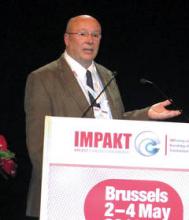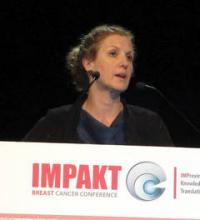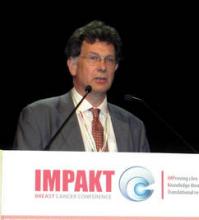BRUSSELS – Metastatic breast cancer cells are even more adaptable and able to evade targeted treatment than researchers suspected as recently as a few months ago, which means they present a heightened treatment challenge that in many cases may be overcome only with multiple targeted therapies delivered at the same time.
The findings were discussed at IMPAKT 2013 Breast Cancer Conference, sponsored by the European Society for Medical Oncology.
The new wrinkle in drug resistance has been dubbed reprogramming, a way that metastatic breast cancer cells (but presumably a property shared by other advanced solid tumors as well) quickly respond to a drug that shuts down an essential cell protein, a kinase, by turning on other, alternative kinases within days of drug exposure. Many of the new, targeted therapies that have successfully treated advanced-stage breast cancer and other solid tumors are kinase inhibitors, such as trastuzumab (Herceptin) and lapatinib (Tykerb).
Using a newly-developed technique for assessing many different kinases within a cell at once, Gary Johnson, Ph.D., reported that treatment of isolated, advanced breast cancer cells in vitro with a kinase inhibitor drug produced within a week a dramatic shift in the cell’s overall kinase profile, something he calls the cell’s "kinome." Part of this reprogramming response probably occurs because of new genes that the cancer cell turns on or upregulates, and part is probably driven by epigenetic changes in the cell, said Dr. Johnson, professor and chairman of pharmacology at the University of North Carolina in Chapel Hill.
Clinicians familiar with this finding quickly recognized that the phenomenon is an important, new barrier to successful treatment in patients that will require creative solutions using rational, multidrug, or multi-sequence regimens.
Dr. Lisa A. Carey, an oncologist who collaborates with Dr. Johnson, said she believes that reprogramming may explain her recent, frustrating results treating metastatic breast cancer patients with an investigational inhibitor of the epidermal growth factor receptor (EGFR), a tyrosine kinase.
"We gave the inhibitor to patients with triple-negative breast cancer, where the EGFR is clearly upregulated, a big, juicy target, and yet only 25% of the patients responded. Most of the time, the cancers had alternative mechanisms to keep the EGFR pathway active," Dr. Carey hypothesized based on Dr. Johnson’s recent findings. "The good news was that 25% of the time the treatment worked," said Dr. Carey, professor of hematology oncology at the University of North Carolina and medical director of the university’s Breast Center.
The new finding on breast-cancer cell reprogramming "helps us understand why the EGFR inhibitor didn’t work in most patients, it helps us understand what cancer cells do, and it helps us design our next approach. Most cancer drug development right now targets kinases," she said in an interview.
"One way to approach this is to use multiple agents at once, but if you add drugs you also add toxicity and expense. And in some patients the cell doesn’t reprogram. We need to understand how reprogramming works," with the potential to develop agents that block reprogramming instead of trying to deal with the changes that reprogramming causes. "This is an explanation of why patients don’t respond to even targeted treatments, and it gives us a way forward to potentially prevent it. Reprogramming is reproducible and potentially targetable. I think we can get around it."
"Limiting emergence of heterogeneity is important because heterogeneity is what defeats us," Dr. Larry Norton, director of the Breast Center at Memorial Sloan-Kettering Cancer Center. New York, said at the conference.
"I need to understand reprogramming of the kinome, what a treatment does to the cancer, and how it influences the next treatment I should use," said Dr. David Cameron, professor of oncology at Edinburgh University. "Patients with breast cancer will be treated with a sequence of agents. We treat patients longer, more effectively, and with more drugs, so we need to worry about what the first drug does to the cancer before we come in with a second.
Giving a clinician’s perspective on the significance of reprogramming in a talk at the meeting, Dr. Cameron said, "we will have to optimize therapy by understanding what one treatment does so we can give the next treatment at the optimal time. If we unravel the way the biology changes in the presence of treatment perhaps we can hone our treatments more effectively."
Dr. Johnson said that he has started a company, KinoDyn, to apply kinase-assessment to treatment, although as of now the company has no funding or employees. Dr. Carey, Dr. Norton, and Dr. Cameron had no disclosures.




